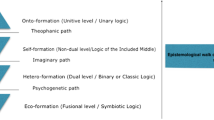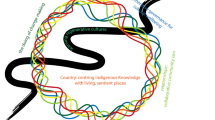Abstract
Regenerative and restorative pedagogy refers to a set of methods and knowledge aimed at regenerating ourselves, regenerating others, and repairing the past and present with a view to human, ecological, and planetary sustainability. It aims to reduce the processes of destructing the self, other humans, and non-humans. The main role of this alternative and transgressive pedagogy is to counter the neoliberal approach of hegemonic education, which contributes to destroying knowledge (epistemicide), identities (identicide), cultures (ethnocide), ethnic groups (genocide), natural environments (ecocide), and animals (zoocide). To achieve these goals, regenerative and restorative education aims to be transdisciplinary; in other words, to transcend the boundaries between disciplines. Regeneration and reparation in education require the creation of citizens capable of understanding that the whole world is one country, and that, wherever we may be, we all share a common destiny.
Similar content being viewed by others
References
Attenoukon, S. A. (2009). L’Afrique, poubelle de l’Occident? La gestion des déchets dangereux [Africa, trash can of the West? The management of hazardous waste]. L’Harmattan.
Canedo, F. (2007). Situación del pueblo Guaraní, tierra y territorio. Capítulo Boliviano de derechos humanos, democracia y desarrollo [Situation of the Guaraní people, land and territory: Bolivian chapter of human rights, democracy, and development]. Fundación Tierra.
Chomsky, N. (2003). Le profit avant l’homme [Profit over people]. Fayard.
Csikszentmihalyi, M. (1990). Vivre. La psychologie du bonheur [Living: The psychology of happiness]. Robert Laffont.
Damus, O. (2016). Homo vulnerabilis. Repenser la condition humaine [Homo vulnerabilis: Rethinking the human condition]. Connaissances et Savoirs/Publibook.
Damus, O. (2017). Las prácticas profesionales de las comadronas tradicionales en Haití: entre salud, biodiversidad y espiritualidad [Professional practices of traditional midwives in Haiti: Between health, biodiversity and spirituality]. In B. Baptiste, D. Pacheco, M. C. D. Cunha. & S. Diaz (Eds.), Knowing our lands and resources. Indigenous and local knowledge of biodiversity and ecosystem services in the Americas (pp. 20–31). UNESCO. https://unesdoc.unesco.org/ark:/48223/pf0000368172
Damus, O. (2020a). Les futurs de l’éducation au carrefour des épistémologies du Nord et du Sud [The futures of education at the crossroads of epistemologies from the North and the South]. UNESCO. https://unesdoc.unesco.org/ark:/48223/pf0000374047
Damus, O. (2020b). En Haïti, la reconquête du corps après un viol [In Haiti, recovering the body after rape]. Études Caribéennes, 45–46. https://doi.org/10.4000/etudescaribeennes.19006
Damus, O. (2021a). Anthropologie de l’accouchement à domicile. Les mères, les matrones et les sages-hommes traditionnels d’Haïti prennent la parole [Anthropology of home childbirth: Mothers, midwives, and traditional male midwives in Haiti speak out]. Presses Universitaires des Antilles.
Damus, O. (2021b). L’atelier de dialogue local, une technique d’enquête pour la promotion de la santé materno-infantile [The local dialogue workshop, a method to promote maternal and child health]. Études Caribéennes, 48. https://doi.org/10.4000/etudescaribeennes.20898
Damus, O. (2021c). Réflexions sur la tolérance et l’intolérance épistémico-ontologiques [Reflections on epistemic and ontological tolerance and intolerance]. Études Caribéennes, 50. https://doi.org/10.4000/etudescaribeennes.22597
Damus, O., Vézina, M., & Gray, N. J. (2022). Valuing indigenous health promotion knowledge and practices: The local dialogue workshop as a method to engage and empower matrons and other traditional healers in Haiti. In L. Potvin & D. Jourdan (Eds.), Global Handbook of Health Promotion Research (Vol. 1, pp. 151–164). Springer. https://doi.org/10.1007/978-3-030-97212-7_12.
Descola, P. (2005). Par-delà nature et culture [Beyond nature and culture]. Gallimard.
Diop, C. A. (1981). Civilisation ou barbarie. Anthropologie sans complaisance [Civilization or barbarism: Anthropology without compromise]. Présence africaine.
Dirzo, R., Young, H. S., Galetti, M., Ceballos, G., Isaac, N. J. B., & Collen, B. (2014). Defaunation in the Anthropocene. Science, 345(6195), 401–406. https://doi.org/10.1126/science.1251817.
Escobar, A. (2018). Sentir-penser avec la terre. Une écologie au-delà de l’Occident [Feeling-thinking with the Earth: An ecology beyond the West]. Seuil.
Fricker, M. (2017). Epistemic injustice: Power and the ethics of knowing. Oxford University Press.
Jobert, G., & Thievenaz, J. (2014). L’homo demirans ou l’homme qui, s’étonnant, devient connaissant [The Homo Demirans or the man who, marveling, becomes knowledgeable]. Éducation Permanente, 200(3), 33–42. https://cnam.hal.science/hal-02290552/document.
Kahn, A., & Papillon, F. (2005). Le secret de la salamandre. La médecine en quête d’immortalité [The secret of the salamander: Medicine in search of immortality]. Nil.
Kolbert, E. (2015). La 6ème extinction. Comment l’homme détruit la vie [The sixth extinction: How man is destroying life]. Vuibert.
Lapassade, G. (2000). Précis de l’inachèvement : Entretiens avec Gérard Gromer [Precis of incompletion: Conversations with Gérard Gromer]. Séguier.
Lewis, S. L., & Maslin, M. A. (2015). Defining the Anthropocene. Nature, 519, 171–180. https://doi.org/10.1038/nature14258.
Mbembe, A. (2023). La communauté terrestre [The Earth community]. La Découverte. https://www.editionsladecouverte.fr/la_communaute_terrestre-9782348072383
Mbembe, A., & Rioux, R. (2022). Pour un monde en commun [For a shared world]. Actes Sud. https://www.actes-sud.fr/catalogue/sciences-humaines-et-sociales-sciences/pour-un-monde-en-commun
Mr Mondialisation (2020, September 22). L’UE exporte massivement des pesticides interdits sur son territoire [The EU massively exports pesticides banned within its territory]. https://mrmondialisation.org/lue-exporte-massivement-des-pesticides-interdits-sur-son-territoire/
Natale, S. M., Libertella, A. F., & Doran, C. J. (2015). For-profit education: The sleep of ethical reason. Journal of Business Ethics, 126, 415–421. https://doi.org/10.1007/s10551-013-1938-1.
Nussbaum, M. (2020). Les émotions démocratiques. Comment former le citoyen du XXIe siècle [Democratic émotions: How to educate the citizen of the 21st century]. Flammarion.
Patou, A. (2021, December 24). L’Afrique, poubelle des pays riches? [Africa, trash can of rich countries?]. https://information.tv5monde.com/afrique/l-afrique-poubelle-des-pays-riches-303241
Pollinis (2020, November 5). Stop à l’exportation des pesticides interdits en Europe [Stop the export of pesticides banned in Europe]. www.pollinis.org/publications/76-ong-demandent-la-fin-de-lexportation-des-pesticides-interdits-en-europe.
Le Quang, M. (2010). Une innovation dans la lutte contre le réchauffement climatique : l’Initiative Yasuní-ITT en Equateur [An innovation in the fight against global warming: The Yasuní-ITT Initiative in Ecuador]. Le Journal des Alternatives.
Roesch, A. (2012). Le modèle de développement équatorien : un tournant biocentrique? Repenser le rapport nature-culture à la lueur de la crise écologique du XXIe siècle [The Ecuadorian development model: A biocentric turn? Rethinking the nature-culture relationship in light of the ecological crisis of the 21st century]. Master’s thesis. Sciences Po Grenoble.
Santos, B. S. (2011). Épistémologies du Sud [Epistemologies of the South]. Études Rurales, 187. https://doi.org/10.4000/etudesrurales.9351
Santos, B. S. (2016). Épistémologies du Sud. Mouvements citoyens et polémiques sur la science [Epistemologies of the South: Citizen movements and controversies on science]. Desclée de Brouwer.
Steffen, W., et al. (2016). Stratigraphic and Earth system approaches to defining the Anthropocene. Earth’s Future, 4(8), 324–345. https://doi.org/10.1002/2016EF000379.
Tawil, S. (2022, November 18). Transforming knowledge for just and sustainable futures. UNESCO Futures of Education Ideas Lab. https://www.unesco.org/en/articles/transforming-knowledge-just-and-sustainable-futures
Tawil, S., & Camille, C. (2023, March 20). Renewing education to transform the future: Critical perspectives on the Transforming Education Summit. UNESCO Futures of Education Ideas Lab. https://www.unesco.org/en/articles/renewing-education-transform-future-critical-perspectives-transforming-education-summit-0.
Truth and Reconciliation Commission of Canada (2015) Canada’s residential schools: The history, Part 1, Origins to 1939. McGill-Queen’s University Press.
UNESCO (2016). L'Education pour les peuples et la planète: créer des avenirs durables pour tous [Education for people and planet: Creating sustainable futures for all]. Global education monitoring report. https://unesdoc.unesco.org/ark:/48223/pf0000247033
UNESCO (2018). Global citizenship education: Taking it local. https://unesdoc.unesco.org/ark:/48223/pf0000265456
UNESCO (2021a). Progress update of the International Commission on the Futures of Education. https://unesdoc.unesco.org/ark:/48223/pf0000375746
UNESCO (2021b). Reimagining our futures together: A new social contract for education. Report from the International Commission on the Futures of Education. https://unesdoc.unesco.org/ark:/48223/pf0000379707.locale=en
Wasserstrom, R., Reider, S., & Lara, R. (2011). Nobody knew their names: The black legend of Tetete extermination. Ethnohistory, 58(3), 421–444. https://doi.org/10.1215/00141801-1263848.
WHO [World Health Organization] (2022, September 15). Pesticide residues in food. https://www.who.int/news-room/fact-sheets/detail/pesticide-residues-in-food
World Commission on Environment and Development (1987). Our common future. United Nations. https://sustainabledevelopment.un.org/content/documents/5987our-common-future.pdf
Wulf, C. (2017). Culture et éducation à la paix dans un monde globalisé [Culture and education for peace in a globalized world]. In O. Damus, C. Wulf, J. P. Saint-Fleur, & D. Jeffrey (Eds.), Pour une éducation à la paix dans un monde violent (pp. 33–53). L’Harmattan.
Author information
Authors and Affiliations
Corresponding author
Additional information
Publisher's Note
Springer Nature remains neutral with regard to jurisdictional claims in published maps and institutional affiliations.
About this article
Cite this article
Damus, O. Regenerative and restorative pedagogy: The foundation of a new contract for cognitive justice. Prospects (2024). https://doi.org/10.1007/s11125-024-09683-y
Accepted:
Published:
DOI: https://doi.org/10.1007/s11125-024-09683-y




